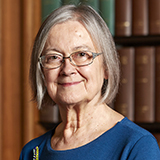Lady Hale: Law has become fairer to women, but battle is not over

Lady Hale
The law has become fairer to women in the past three and a half decades, but “no-one can claim that the battle is over”, the president of the UK Supreme Court has said.
Speaking at an event to mark the Birmingham Law Society’s 200th anniversary, Lady Hale reflected on the progress since she and Susan Atkins published their book, Women and the Law, in 1984.
At the time, she said, the pair had concluded that “the law was not the neutral and objective entity which it was generally assumed to be”, but was “shot through with male perceptions, anxieties and interests”.
Lady Hale continued: “So how have things changed since then? A very great deal. Sex offences are now defined in gender-neutral ways. Marital rape has become a crime. Remedies for domestic violence and abuse have improved. The definition of domestic abuse has expanded to cover non-physical forms of violence.
“Inequalities in tax, social security and pension schemes have largely been removed. Equal pay for work of equal value has been introduced and trade unions are now supporting the women’s claims. Pregnancy is now a protected characteristic under the Equality Act. Courts and tribunals are now much more ready to recognise discrimination when they see it.
“But no-one can claim that the battle is over. We are just beginning to recognise the phenomenon of sexual exploitation, not just of children but also of vulnerable adults. Successful prosecutions in cases of sexual assault are rare in proportion to the complaints made. Systemic failures in investigation were vividly illustrated recently in a case where the victims of the ‘black cab rapist’ claimed compensation from the police for failing to protect them.
“Domestic violence and abuse is still all too common and, according to a recent study, a frequent reason why women lose their children into the care system. But the improved financial rights available on divorce are under threat on the assumption that women no longer need their protection. The gender pay gap is still much larger than it should be. The recent changes in the benefits system have had a much more serious impact upon lone parents, who are overwhelmingly women. There are still too few women at the top of various professions. I could go on.”
However, she concluded the speech, delivered last November, by saying there were also “many reasons to be cheerful”, with major strides forward in women’s representation in various professions and feminist legal studies being taken more seriously.








